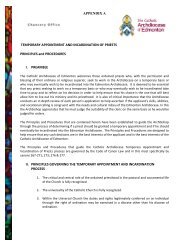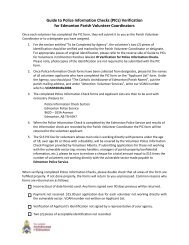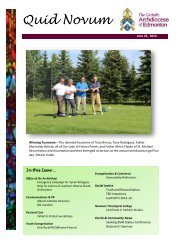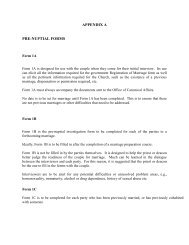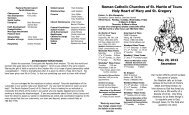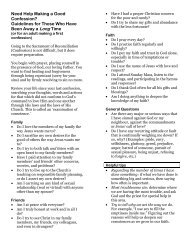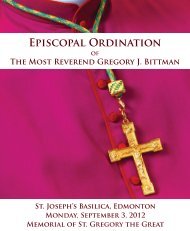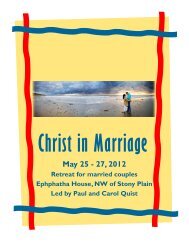HIGH SCHOOL GRADUATION LITURGY OF THE WORD Guidelines ...
HIGH SCHOOL GRADUATION LITURGY OF THE WORD Guidelines ...
HIGH SCHOOL GRADUATION LITURGY OF THE WORD Guidelines ...
Create successful ePaper yourself
Turn your PDF publications into a flip-book with our unique Google optimized e-Paper software.
<strong>HIGH</strong> <strong>SCHOOL</strong> <strong>GRADUATION</strong><br />
<strong>LITURGY</strong> <strong>OF</strong> <strong>THE</strong> <strong>WORD</strong><br />
<strong>Guidelines</strong><br />
Pastoral Notes<br />
Order of Service<br />
Created: May 2007<br />
Liturgy Commission – Archdiocese of Edmonton<br />
Revised: October 2008<br />
Rev. Paul Kavanagh<br />
Archbishop Richard Smith
Graduation from High School<br />
GUIDELINES<br />
Graduation from Senior High School is an important occasion in the lives of the graduates, their families,<br />
friends, teachers, other school staff, and younger students.<br />
Graduation marks the end of High School education. It is also the beginning of a new phase of the<br />
students’ lives: further schooling for some, employment for others, perhaps married life. For all, it is a<br />
“rite of passage” from adolescence to relative maturity and greater independence.<br />
High School graduation is a time to recognize what the graduating students have accomplished and the<br />
effort that was required to reach this goal. It is a time to celebrate the ups and downs that accompanied<br />
not only the academic work but also the maturing that is part of High School education. It is a time to<br />
look forward in hope and expectation to what the future will bring. It is a time for students to thank<br />
teachers and other school staff, their families, and their fellow students for helping them reach this<br />
moment.<br />
The Celebration of Graduation<br />
The celebration of graduation has several dimensions.<br />
One of these is academic and this is expressed through the conferring of diplomas, the valedictory<br />
address, and perhaps other speeches.<br />
A second dimension is social: parties at home and among the graduating students, both in school and<br />
elsewhere. Neither the academic nor social aspect of graduation is explicitly religious in nature.<br />
For Catholics and other Christians and persons of other faiths, graduation also has a religious<br />
dimension. This calls for religious celebrations to accompany the academic and social aspects.<br />
Graduation is a time for students to give thanks for the presence of God throughout their High School<br />
years. It is a time as well to ask for God’s blessing and presence in their lives to come. It is a time to<br />
commit themselves to living the Christian life more seriously and intentionally in the days and years that<br />
lie ahead.<br />
The graduation of students from Catholic secondary schools is also an important event for the local<br />
Church community to which they belong. It is an occasion to acknowledge the rich heritage of faith in<br />
and by which the graduates have been nourished during their formative years in our Catholic schools. It<br />
is also an occasion to celebrate the variety of gifts manifest in our young people and to give thanks to<br />
God who is the giver of all good things.<br />
Liturgical Celebration of Graduation<br />
Liturgy is communal ritual prayer. The conferring of diplomas and accompanying speeches is not<br />
Christian liturgy. How are liturgy and academic exercises to be related at the time of Senior High School<br />
Graduation? How can both kinds of events be celebrated without neglecting the proper character of<br />
each?
The religious celebration of graduation may be expressed through liturgical celebrations that are carried<br />
out independently of the academic exercises. Liturgies may be celebrated some time before or after the<br />
graduation itself. Such liturgies could be celebrated in the school or in the parish.<br />
It is customary in many instances to combine the religious and academic dimensions of graduation in a<br />
single occasion. A recommended form for celebration is a Liturgy of the Word followed by Academic<br />
Exercises. Several factors need to be taken into consideration. One is the total length of the event,<br />
which should not be excessive. Secondly, the liturgical and academic elements need to be reasonably<br />
well balanced in emphasis. Finally, the two elements should be connected, and not just set side by side.<br />
The Eucharist<br />
The Eucharist (the Mass) is the principal Sunday celebration of the Catholic Church. It is not, however,<br />
the only liturgy of the Church. The celebration of the Eucharist at academic graduation exercises is<br />
strongly discouraged. It is not appropriate to insert the conferring of diplomas, the valedictory address,<br />
etc. into the middle of the Eucharistic Liturgy, i.e. at the end of the Liturgy of the Word or before the<br />
concluding rite. Although this is an important part of the graduation ceremony, it would introduce a<br />
lengthy and primarily non-religious element into the Eucharistic Liturgy and would disrupt its unity.<br />
It is also inappropriate to celebrate the Eucharist immediately following the conclusion of the academic<br />
part of graduation. Each part – the liturgy, the conferring of diplomas, the speeches – requires a<br />
significant length of time. A combined celebration will be uncomfortably long. The celebration of the<br />
Eucharist requires attention and energy, and this is also true of the academic exercises. It would be<br />
difficult to celebrate both elements well under these circumstances.<br />
At many graduation celebrations a significant number of graduates, fellow students, family members and<br />
guests will not be Roman Catholics. They will not be able to participate fully in a Catholic Eucharistic<br />
Liturgy. Under such circumstances, the Eucharist can be divisive rather than a sacrament of unity.<br />
A Parish Eucharist<br />
Parishes are encouraged to take note of a High School graduation in a parish celebration of the<br />
Eucharist, perhaps on a convenient evening or on a Sunday afternoon, in the students’ parishes the<br />
week before or after graduation. This might be done by issuing a special invitation to graduates and<br />
their families and by welcoming them warmly. Their presence and achievement might be noted in the<br />
presider’s opening greeting, the preaching and the general intercessions.<br />
Graduates who are practicing members of their faith community and who are qualified to do so, might<br />
serve as liturgical ministers. A reception or meal for graduates and their families and guests might follow<br />
the celebration of the Eucharist.<br />
PASTORAL NOTES<br />
The basic principles of contemporary liturgical celebration apply to High School graduation liturgies.<br />
One important principle is that Christ is present in the assembly (the gathered people), in the<br />
presiding minister, and in the Word of God.
Participation<br />
The full, active, conscious and fruitful participation of everyone should be facilitated. Everyone has a<br />
role; no one is a passive spectator. All participate by singing, listening, responding, seeing, and hearing.<br />
The primary ministry of any liturgy is the entire worshipping assembly.<br />
Leadership<br />
Leadership in preparing the academic part of graduation usually will be taken by the school principal, in<br />
collaboration with teachers and trustees or by a designated graduation committee. Leadership in<br />
preparing the liturgical celebration may be exercised by designated persons or graduation committee in<br />
consultation with the parish pastor or another priest or by a lay school chaplain. The pastor, or another<br />
priest, will usually be the presider for the religious element of the graduation liturgy.<br />
Liturgical Ministers<br />
Graduation liturgies, like other liturgical celebrations require a number of ministers in addition to the<br />
presider: readers, servers, music ministers (instrumentalists, cantor, and leader of song and/or choir).<br />
Persons selected as these ministers should be qualified for their ministries. Readers in particular may<br />
need training and rehearsal. All ministers need to be well rehearsed to facilitate the flow of the liturgy.<br />
Language<br />
The language used in all the liturgical texts and readings as well as the preaching and other texts that<br />
are composed should be gender inclusive in keeping with the principles adopted by the Canadian<br />
Conference of Catholic Bishops.<br />
Music<br />
A liturgical celebration without music lacks the sense of joy and elation that is an essential element of<br />
Christian worship and that needs to be fostered among those who participate. Music brings about and<br />
expresses unity, joy and celebration; it makes the celebration more powerful and meaningful; it assists<br />
the believers to proclaim their faith.<br />
A basic principle to be observed is that the music chosen should enable the participation of all<br />
present. This may present a challenge in that the worshipping community may be less homogeneous<br />
than at Sunday Eucharist. The people present may not be used to worshipping together, let alone<br />
singing together.<br />
The selection of music for graduation liturgies needs special attention in the planning process; good<br />
celebrations do not just happen. The music for liturgical celebrations is chosen on the basis of<br />
liturgical, pastoral and musical judgments. Do the musical selections fit the movement of the liturgy<br />
and support the ritual action? Are they suitable for this group of people? Good musical leadership must<br />
be provided by instrumentalists, cantor, and leader of song and/or choir.<br />
The provision of an Order of Service outlining the celebration and including the music and texts will<br />
enable the participation of those gathered for worship.
Preparing the Celebration<br />
Graduation liturgies need to be well prepared. This should be a collaborative effort involving members<br />
of the graduating class, teachers, chaplain, and school administrators. If the parish priest or another<br />
priest presides, he should be consulted well in advance of the celebration and be invited to participate in<br />
the preparation of the liturgy.<br />
The preparation process involves:<br />
� The shape and flow of the liturgy. What form will be used? How will this relate to the<br />
academic exercises?<br />
� Environment. Where will the graduation liturgy be celebrated? How will this place of worship<br />
be decorated?<br />
� Hospitality. How ill families, gusts and other participants be welcomed?<br />
� Movement and seating. What shape will the processions take? Where will the graduates,<br />
leader(s), and ministers sit and stand for the different parts of the liturgy?<br />
� Liturgical ministers. Who will serve as presider, readers, servers, hospitality ministers, and<br />
music ministers?<br />
� Music. What music will be selected? When will it be sung or played? Who will provide the<br />
musical leadership?<br />
� Biblical Texts. What readings from the Hebrew and Christian Scriptures will be proclaimed?<br />
What psalm will be sung?<br />
� Liturgical Texts. What liturgical texts (prayers) will be chosen or composed?<br />
� Order of Service. What order of service will be prepared to enable participation by those<br />
gathered? Who will prepare this?<br />
Order of Service<br />
An Order of Service is one way to promote participation. It will provide an outline of the liturgy, give in<br />
full the texts that the assembly needs and make reference to another book such as a hymnal or provide<br />
the music and text of the music selections. It may also provide directions and other information, and<br />
may name persons who have special rose. Finally, it may serve as a memento of the graduation.<br />
The Order of Service need not include texts used by the presider or readers. If the music and/or text of<br />
the music selections are printed, prior permission of the copyright holder must be obtained and the<br />
source of the selection acknowledged. Readings may be identified by title and biblical reference. For<br />
example, “Remain in my love. John 15:12,” rather than simply “John 15:12.”
<strong>LITURGY</strong> <strong>OF</strong> <strong>THE</strong> <strong>WORD</strong><br />
ORDER <strong>OF</strong> SERVICE<br />
Procession<br />
Opening Hymn<br />
Sign of the Cross and Liturgical Greeting<br />
Litany of Praise<br />
Opening Prayer<br />
First Reading<br />
Responsorial Psalm<br />
Second Reading (optional)<br />
Gospel Acclamation<br />
Gospel Reading<br />
Homily<br />
Intercessions<br />
The Lord’s Prayer<br />
Concluding Prayer<br />
Blessing<br />
Closing Hymn<br />
ACADEMIC EXERCISES
Procession<br />
<strong>LITURGY</strong> <strong>OF</strong> <strong>THE</strong> <strong>WORD</strong><br />
(Sample)<br />
Entrance of the liturgical ministers and graduates accompanied by instrumental music:<br />
Cross bearer and servers with processional candles, reader with the lectionary, graduates, and presider.<br />
Opening Hymn<br />
A hymn may be sung by all after the graduates and liturgical ministers are in their places. A hymn of<br />
praise is appropriate.<br />
Sign of the Cross and Liturgical Greeting<br />
Presider: In the name of the Father, and of the Son,<br />
+ of the Holy Spirit.<br />
All: Amen.<br />
Presider: The grace and peace of God the Father<br />
and the Lord Jesus Christ be with you.<br />
All: And also with you.<br />
Litany of Praise<br />
Presider: You give your Spirit that we might live as your people:<br />
Lord, have mercy.<br />
All: Lord, have mercy.<br />
Presider: You give your Spirit that we may have new life:<br />
Christ, have mercy.<br />
All: Christ, have mercy.<br />
Presider: You call us to be your witnesses, even to the ends of the earth:<br />
Lord, have mercy.<br />
All: Lord, have mercy.<br />
Opening Prayer<br />
Presider: Let us pray:<br />
God, our Creator,<br />
We praise you for giving us our Son<br />
To be our Saviour and Lord.<br />
Bless us as we gather here today (tonight)<br />
To rejoice in your gifts of wisdom and knowledge,<br />
And live happily in your love.<br />
Hear our prayer,<br />
For we ask this in Jesus’ name.<br />
All: Amen.
First Reading<br />
See attached list of suggested readings. The reader concludes by saying:<br />
The Word of the Lord.<br />
All: Thanks be to God.<br />
Responsorial Psalm<br />
An appropriate psalm should be sung as a response to the reading. See the Psalm Index in<br />
Catholic Book of Worship III.<br />
Second Reading (optional)<br />
Gospel Acclamation<br />
Homily<br />
The “alleluia” is sung in preparation for the reading of the gospel.<br />
The presider will give a homily based on the readings selected.<br />
General Intercessions<br />
The presider will invite the assembly to pray for the needs of the graduates, the Church and the<br />
world.<br />
A reader may serve as intercessor and present the petitions composed for the occasion. All<br />
respond: “Lord, hear our prayer” after each petition.<br />
The presider will conclude with a brief prayer.<br />
The following petitions may be included:<br />
� for the graduates<br />
� for families and the school community<br />
� for the Church<br />
� for the world<br />
� for persons in need.<br />
The Lord’s Prayer<br />
The presider invites all to join in the Lord’s Prayer. It is appropriate to conclude with the<br />
doxology “for the kingdom, the power and the glory are yours, now and forever. Amen” after the<br />
words “but deliver us from evil.”
Concluding Prayer<br />
Presider: Lord Jesus, our brother and Savior,<br />
You have promised to be present among us<br />
Whenever we come together in your name.<br />
Remain with us as we gather to celebrate all we have achieved<br />
Through your inspiration<br />
And all we have accomplished<br />
With your saving help.<br />
Jesus, we praise you<br />
For you are Lord for ever and ever.<br />
All: Amen.<br />
Blessing<br />
All: Amen.<br />
Closing Hymn<br />
The presider may offer a simple or solemn blessing.<br />
The liturgy may conclude with a closing hymn. The presider, cross-bearer and candle-bearers<br />
may process out.<br />
All are seated for the Academic Exercises that follow.
SCRIPTURE READINGS<br />
The following or other selected passages may be appropriate:<br />
Sirach 1:1-10 The mystery of wisdom<br />
Sirach 4:11-19 Wisdom as educator<br />
Sirach 51:13-19 The search for Wisdom<br />
Psalm 19, 25, 100, 138 [see Catholic Book of Worship III]<br />
Romans 1:8-13 Thanksgiving and prayer<br />
Romans 8:28-39 God has called us<br />
1 Corinthians 1:4-9 Thanksgiving<br />
1 Corinthians 12:4-11 The variety of gifts<br />
1 Corinthians 12:31-13:1-13 Love<br />
Ephesians 1:3-14 God’s plan of salvation<br />
Ephesians 3:14-21 Paul’s prayer<br />
Ephesians 4:1-8 Call to unity<br />
Philippians 1:3-11 Thanksgiving and prayer<br />
Philippians 3:12-14 Pressing on toward the goal<br />
Philippians 4:4-9 Last advice<br />
Colossians 1:3-12 Thanksgiving and prayer<br />
2 Thessalonians 2:13-17 Encouragement to persevere<br />
1 Peter 1:3-9 Salvation of Christians<br />
1 John 4:7-12 Love of God and neighbor<br />
Matthew 5:3-12 The beatitudes<br />
Matthew 25:14-20 Parable of the talents<br />
John 15:5, 7-9 I am the vine<br />
John 17:11b, 17-21 Priestly prayer of Jesus<br />
RESOURCES<br />
A Book of Blessings (Ottawa: Canadian Conference of Catholic Bishops, 1981)







